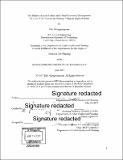The balance of local culture and global economic development : the case of the Nyarugenge Heritage Village in Kigali, Rwanda
Author(s)
Ndengeyingoma, Billy
DownloadFull printable version (5.735Mb)
Other Contributors
Massachusetts Institute of Technology. Department of Urban Studies and Planning.
Advisor
Gabriella Carolini.
Terms of use
Metadata
Show full item recordAbstract
As the fastest urbanizing continent in the next three decades, Africa is projected to play a major role in the global economy. The upward trend in the influx of foreign direct investments is set to continue thanks to an overall stable political and macroeconomic climate on the continent and microeconomic reforms in many countries. The country of Rwanda stands out for its reforms to ease business and for its attention to spatial planning as they relate to global competitiveness. The extensive master planning process for its capital Kigali exemplifies the city's aims to integrate its economy in the global market through strategic physical developments including heritage preservation. This thesis interrogates the references to and the inclusion of heritage preservation in the planning priorities of a post-colonial, post-conflict and developing city like Kigali aiming to operate as a global city. The plans for the Nyarugenge Heritage Village, currently an active wholesale trading center, will serve as a case study to assess Kigali's intentions to balance its local culture with its participation in the global economy. The case study is discussed through a content analysis of city master plans and interviews with planning stakeholders as well as with store owners in the trading center. The analysis reveals heritage preservation is primarily meant as a tourism attraction and an economic development strategy. In light of this conclusion, the thesis ends on a discussion of a holistic planning process which could achieve a better balance between local culture and global economic development.
Description
Thesis: M.C.P., Massachusetts Institute of Technology, Department of Urban Studies and Planning, 2017. Cataloged from PDF version of thesis. Includes bibliographical references (pages 52-54).
Date issued
2017Department
Massachusetts Institute of Technology. Department of Urban Studies and PlanningPublisher
Massachusetts Institute of Technology
Keywords
Urban Studies and Planning.